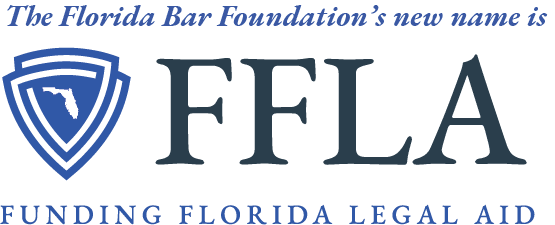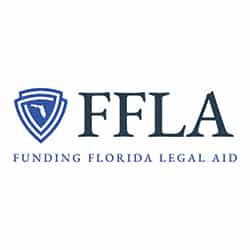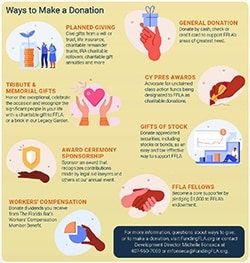In December 2023, The Florida Bar Foundation changed its name to FFLA. Posts prior to this date contain our former name.
The Florida Bar Foundation has submitted a comment to the Florida Supreme Court on a proposed rule amendment related to technology. The Foundation joined the Florida Civil Legal Aid Association in concern that the proposed amendments may decrease meaningful access to the
justice system and/or hinder or delay the delivery of substantial justice especially in matters involving the elderly, the poor or others
unable to afford or ill-equipped to navigate the technology required to comply with the proposed rules.
Below is the comment submitted in October 2021:
IN THE SUPREME COURT OF FLORIDA CASE NUMBER SC 21-990
IN RE: AMENDMENTS TO FLORIDA RULES OF CIVIL PROCEDURE, FLORIDA RULES OF GENERAL PRACTICE AND JUDICIAL ADMINISTRATION, FLORIDA RULES OF CRIMINAL PROCEDURE, FLORIDA RULES OF TRAFFIC COURT, FLORIDA SMALL CLAIMS RULES, AND FLORIDA RULES OF APPELLATE PROCEDURE
COMMENTS OF THE FLORIDA BAR FOUNDATION
The Florida Bar Foundation, by and through its President, hereby files the following comments in this matter.
The Florida Bar Foundation is a statewide 501 (c)(3) public charity that provides funding for legal aid and improvements in the administration of justice. It was established in 1956 by The Florida Bar Board of Governors and the Florida Supreme Court. It funds organizations that make access to the justice system possible for those who would otherwise fall through the cracks. In so doing, it collaborates with various qualified legal aid providers and grantee organizations that have been a mainstay in protecting the Rule of Law for those who cannot otherwise afford a lawyer. The Florida Civil Legal Association (FCLAA) is an organization of many of those legal aid providers and grantee organizations and is viewed by the Foundation as a knowledgeable and respected resource as it relates Filing # 135660952 E-Filed 09/30/2021 01:24:43 PM
SC 21-990 to issues of civil legal aid and access to the justice system.
The Foundation respectfully joins the comments made and concerns raised by FCLAA in connection with the proposed amendments in question; especially the Proposed Rule 2.516. The Foundation also respectfully suggests that the proposed rule creates a substantial risk of at least two unintended consequences. First, while it is commendable to try and use technology as a tool to increase access to the justice system,
requiring it in the manner proposed most likely will result in technology being a hindrance to judicial access for many. In short, FCLAA’s comments make clear that Florida’s most vulnerable populations lack the means and wherewithal to obtain the necessary technology in order to comply with mandatory e-service, e-filing, the creation of email addresses, and virtual appearances for hearings.
Requiring someone unable to afford, use or understand a technological tool in order to access the justice system could literally close the courthouse doors for those unable to cross the technological threshold.
Secondly, the proposed rule is likely to result in increased defaults or dismissals entered against persons with meritorious claims or defenses, but who lack the means or aptitude to comply with the proposed technological requirements. The inability to afford or use technology by those persons will inevitably lead to either unnecessary delays in the proceedings and/or defaults and dismissals. The delays will require more judicial time and resources and will lead to more work for the courts and for lawyers tasked with addressing motions to set aside defaults or refile claims. In addition, defaults entered because of a variety of valid reasons, including excusable neglect and oversight have historically and consistently been set aside by Florida courts because, as this Court has consistently held, the preferred mechanism for determining valid cases and controversies are trials on the merits, not defaults. UNorth Shore Hospital, Inc. v. BarberU, 143 So.2d 849 (Fla. 1962) citing UState Bank of Eau Gallie v. RaymondU, 103 So. 40 (Fla. 1931)(“[i]f there by (sic) any reasonable doubt in the matter [of vacating a default], it should be resolved in favor of granting the application and allowing a trial upon the merits of the case.”).
The Foundation supports the goal of the justice system to effectuate substantial justice. Chief Justice B.K. Roberts reflected on this aspiration in UBarberU when commenting on this Court’s decision in UWaterson v. Seat and CrawfordU, 10 Fla. 326 (Fla. 1863). The Chief Justice wrote,
“The court also stated that ‘* * * it is the tendency of the courts of the present age to stand less upon strict rules of practice than formerly, and to keep the door a long time open to a defendant who seems to be honestly striving to get in what he believes to be a good defense.’ Those lines were penned in 1863. When they are compared with the decision of the District Court herein, it gives cause to wonder how much progress we have made in the last hundred years toward liberalizing rules of procedure so as to achieve substantial justice.” UBarberU, 143 So.2d at 853.
The Foundation therefore joins in FCLAA’s concern that the proposed amendments may in fact decrease meaningful access to our justice system and/or hinder or delay the delivery of substantial justice; especially in matters involving the elderly, the poor or others unable to afford or ill-equipped to navigate the technology required to comply with the proposed rules.
For these reasons, the Foundation joins FCLAA in its request that these issues be studied further before the rule is adopted. The Foundation also expresses its gratitude to the Court and the Work Group for its work and attention to these important issues in these challenging and difficult times.





